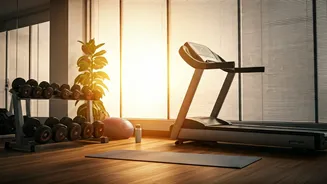Morning Workout Perks
Working out in the morning offers several advantages. Early risers often find they're more consistent with their routines because they fit exercise in before
the day's commitments take over. Morning workouts can also give a metabolic boost, potentially helping with weight management by burning more calories throughout the day. Additionally, sunlight exposure during morning workouts helps regulate the body's natural sleep-wake cycle, potentially improving sleep quality. However, mornings might not suit everyone. Some people experience lower energy levels or less muscle strength first thing, which could impact the intensity and effectiveness of their workouts. This makes the optimal time for exercise highly individualized, influenced by personal habits and physiological responses.
Evening Workout Benefits
Evening workouts also present a range of benefits. Body temperature is generally higher in the late afternoon and evening, potentially leading to improved muscle function and flexibility. This could mean more efficient and perhaps more enjoyable workouts. Furthermore, the evening is often a convenient time to exercise for many, allowing them to de-stress after work or school. This time of day might also provide more time to prepare for a proper workout or enjoy social fitness activities. Nonetheless, evening workouts have their downsides. They may potentially interfere with sleep for some individuals, depending on the intensity and timing of the exercise. Planning and routine are crucial, making it easier to ensure consistency, but it does require careful consideration of personal schedules.
Factors to Consider
When deciding between morning or evening workouts, several factors warrant consideration. Personal preference is key – do you enjoy feeling energized first thing, or do you prefer to unwind after a long day? Assess your energy levels at different times; some people naturally have more energy in the morning, while others peak later. Consider your daily schedule; morning workouts work well for those who can get them done before work or other obligations. For those with a more flexible schedule, evening workouts may fit better. Also, consider the specific type of exercise you enjoy; higher-intensity workouts might be more comfortable when your body is naturally warmed up, as often happens in the evening. Ultimately, what is most effective is the workout you can consistently stick to.
Expert Insights and Advice
Experts suggest listening to your body's signals when choosing your workout time. There is no one-size-fits-all answer; the best time depends on your individual physiology and preferences. Consider consulting a fitness professional to help you create a personalized workout plan that suits your schedule, energy levels, and fitness goals. To optimize performance, think about what you eat before and after a workout, regardless of the time. Also, remember the importance of proper hydration. Regardless of when you exercise, consistency is the key to seeing positive results. Experiment with different times and exercise types to find what works best for you and your lifestyle, ensuring that you find workouts enjoyable and sustainable.


















